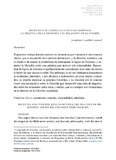| dc.rights.license | http://creativecommons.org/licenses/by-nc-sa/3.0/ve/ | es_VE |
| dc.contributor.author | Caudillo Lozano, Jonathan | |
| dc.date.accessioned | 2022-11-28T13:17:11Z | |
| dc.date.available | 2022-11-28T13:17:11Z | |
| dc.date.issued | 2022-11-28 | |
| dc.identifier.issn | 1316-7839 | |
| dc.identifier.uri | http://www.saber.ula.ve/handle/123456789/48644 | |
| dc.description.abstract | El presente trabajo intenta rastrear los elementos que vinculan el movimiento
cínico, que se desarrolló en el periodo helenístico, y la filosofía socrática, con
el objetivo de pensar la posibilidad de reimaginar la figura de Sócrates, y entender
la filosofía como una práctica que incluye a la corporalidad. Reconstruir
la figura de Sócrates es particularmente complicado si se tiene en cuenta
el hecho de que nunca escribió. Sin embargo, si no nos limitamos únicamente
al testimonio platónico, y nos abrimos a testimonios un poco menos conocidos,
es posible repensar su práctica filosófica y su relación con el cinismo
como una perspectiva sobre la filosofía que desarrolló una serie de inquietudes
sobre las relaciones entre alma y cuerpo, que no siempre son recuperadas
en la historia de la filosofía occidental. | es_VE |
| dc.language.iso | es | es_VE |
| dc.publisher | SaberULA | es_VE |
| dc.rights | info:eu-repo/semantics/openAccess | es_VE |
| dc.subject | Socratismo | es_VE |
| dc.subject | Cinismo | es_VE |
| dc.subject | Corporalidad | es_VE |
| dc.subject | Sabiduría | es_VE |
| dc.title | Sócrates y el cinismo, claves para repensar la práctica de la filosofía y su relación con el cuerpo | es_VE |
| dc.title.alternative | Socrates and cynicism, keys to rethink the practice of philosophy and its relationship with the body | es_VE |
| dc.type | info:eu-repo/semantics/article | es_VE |
| dcterms.dateAccepted | 24/11/2022 | |
| dcterms.dateSubmitted | 15/11/2022 | |
| dc.description.abstract1 | This paper tries to trace the elements that link the Cynic movement, which
developed in the Hellenistic period, and Socratic philosophy, with the aim of
thinking about the possibility of reimagining the figure of Socrates, and
understanding
philosophy as a practice that includes the body. Reconstructing
the figure of Socrates is particularly complicated if one takes into account the
fact that he never wrote. However, if we do not limit ourselves only to the
Platonic testimony, and we open ourselves to slightly less well-known testimonies,
it is possible to rethink his philosophical practice and its relationship
with Cynicism as a perspective on philosophy that developed a series of concerns
about the relationships between soul and body, which are not always
recovered in the history of Western philosophy. | es_VE |
| dc.description.colacion | 62-75 | es_VE |
| dc.description.email | jonathan.caudillo@cenart.gob.mx | es_VE |
| dc.description.frecuencia | Anual | |
| dc.description.paginaweb | http://www.saber.ula.ve/dikaiosyne | |
| dc.identifier.depositolegal | pp-199802ME321 | |
| dc.publisher.pais | Venezuela | es_VE |
| dc.subject.institucion | Universidad de Los Andes | es_VE |
| dc.subject.keywords | Socratism | es_VE |
| dc.subject.keywords | Cynicism | es_VE |
| dc.subject.keywords | Corporality | es_VE |
| dc.subject.keywords | Wisdom | es_VE |
| dc.subject.seccion | Dikaiosyne: Artículos | es_VE |
| dc.subject.tipo | Artículos | es_VE |
| dc.type.media | Texto | es_VE |


